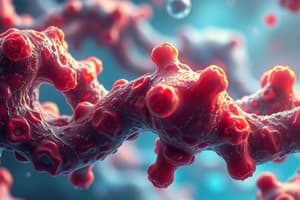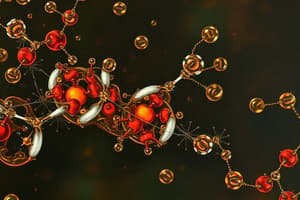Podcast
Questions and Answers
Which term describes an enzyme?
Which term describes an enzyme?
- Product
- Reactant
- Substrate
- Catalyst (correct)
Which component is released from the active site of an enzyme during a chemical reaction?
Which component is released from the active site of an enzyme during a chemical reaction?
Product
The lock-and-key mechanism refers to?
The lock-and-key mechanism refers to?
The complementary shapes of an enzyme and a substrate.
Which two substances bind using a lock-and-key mechanism?
Which two substances bind using a lock-and-key mechanism?
Which is the best definition of activation energy?
Which is the best definition of activation energy?
What is a substrate?
What is a substrate?
Which statement best describes how a catalyst can speed up a chemical reaction?
Which statement best describes how a catalyst can speed up a chemical reaction?
Photosynthesis is an example of?
Photosynthesis is an example of?
Describe the method a researcher should use to determine if the inorganic substance A affects the reaction rate between liquids X and Y.
Describe the method a researcher should use to determine if the inorganic substance A affects the reaction rate between liquids X and Y.
How can a student identify the catalyst in her experiment with substances X, Y, and Z?
How can a student identify the catalyst in her experiment with substances X, Y, and Z?
How does a catalyst work?
How does a catalyst work?
Which statement correctly describes a chemical reaction?
Which statement correctly describes a chemical reaction?
Lactase and carbonic anhydrase are examples of what type of substance?
Lactase and carbonic anhydrase are examples of what type of substance?
What must happen before a chemical reaction can begin?
What must happen before a chemical reaction can begin?
A substance that influences the reaction but does not participate in the reaction is a?
A substance that influences the reaction but does not participate in the reaction is a?
Flashcards are hidden until you start studying
Study Notes
Catalysts Overview
- Enzymes act as catalysts in biochemical reactions, enhancing reaction rates without being consumed.
- Catalysts lower activation energy, creating alternative pathways for reactions to occur.
Key Terms and Definitions
- Catalyst: A substance, typically an enzyme, that increases the rate of a chemical reaction by decreasing the activation energy needed.
- Product: The result of a chemical reaction formed from the substrate after being released from the enzyme's active site.
- Substrate: The specific reactant molecule that is acted upon by an enzyme.
- Activation Energy: The energy threshold needed to initiate a chemical reaction, involving bond formation or breakage.
Mechanisms of Catalysis
- The lock-and-key mechanism describes how enzymes and substrates fit together perfectly due to their complementary shapes.
- Reactions such as photosynthesis are classified as endothermic, requiring energy input to proceed.
Experimental Designs
- To test if an inorganic substance affects reaction rates, measure the time taken for liquids to clear with and without the substance.
- In a controlled experiment with substances X, Y, and Z, the quickest test tube to stop bubbling indicates the presence of the catalyst.
Chemical Reaction Dynamics
- During a chemical reaction, bonds between atoms break and re-form to form new products.
- The presence of a catalyst leads to faster reactions by optimizing the pathways for molecular interactions.
Examples of Enzymes
- Lactase and carbonic anhydrase are specific enzymes that facilitate biochemical processes within the body.
Requirements for Reactions
- Activation energy must be achieved to initiate any chemical reaction; without it, reactions will not proceed.
Conclusion
- Catalysts are crucial for speeding up reactions, making them vital in both natural biological processes and industrial applications.
Studying That Suits You
Use AI to generate personalized quizzes and flashcards to suit your learning preferences.




